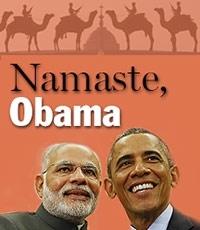'The two leaders have a lot in common, from their humble beginnings to coming into office following high-energy campaigns and generating high expectations. They sort of "changed the way in which politics is practised" in India and the United States.'
Aziz Haniffa/Rediff.com reports from Washington, DC, on what makes Prime Minister Narendra Modi and US President Barack Obama get along so well.

At a White House teleconference previewing Barack Obama’s visit to India next week, American journalists were intrigued by the chemistry between the United States president and Prime Minister Narendra Modi and what led to their almost picture-perfect rapport.
Ben Rhodes, deputy national security advisor for strategic communications and a close aide to Obama, and Phil Reiner, senior director at the national security council for South Asia, explained that both leaders had a lot in common, from the use of new technology and humble beginnings to coming into office following high-energy campaigns and generating high expectations, that evidently made them tick.
Modi, recalled Rhodes, “is a very ambitious leader and he was elected after a very dynamic and innovative campaign in India, in which he utilised new technology.”
“In their first conversation, after Prime Minister Modi’s election, they noted some similarities in terms of how their campaigns sort of changed the way in which politics is practised in our respective countries,” he said.
“They both noted that they came into office following high-energy campaigns that utilised very broad-based outreach, and also, Prime Minister Modi came into office as a leader who raised significant expectations in India.”
According to Rhodes, Modi has been very forthright in his ambitions in terms of what he wants to achieve and moving the Indian economy forward. He spoke of how, “it was not unlike President Obama’s view of how he came into office, wanting to, again, tackle a very ambitious economic agenda.”
“So, again, what they shared off the bat was a similar experience of having run these very dynamic campaigns, having intentionally and deliberately being ambitious in their programmes and having high expectations within their democracies.”
Thus, Rhodes said, “they shared that type of experience although now President Obama is a leader who is in his sixth year into office and Prime Minister Modi is just at the beginning.”
 But he acknowledged that during Modi’s visit to Washington in September 2014, “They had a long discussion over dinner. And the next day, in addition to the meeting, it was very meaningful for the president to be able to visit the Martin Luther King Memorial with Prime Minister Modi, given the links between Martin Luther King and Mahatma Gandhi that speaks to a kind of shared sense of struggle and shared values between the United States and India.”
But he acknowledged that during Modi’s visit to Washington in September 2014, “They had a long discussion over dinner. And the next day, in addition to the meeting, it was very meaningful for the president to be able to visit the Martin Luther King Memorial with Prime Minister Modi, given the links between Martin Luther King and Mahatma Gandhi that speaks to a kind of shared sense of struggle and shared values between the United States and India.”
“So, they struck up a good chemistry and again, Prime Minister Modi being ambitious and kind of forward-looking is a good asset for this relationship,” he said, “because he has focused a lot of that energy on domestic issues and the economy. But, the fact that he wants the US-India relationship to be a part of his ambitions is a significant factor in opening the space to get some things done here.”
Rhodes said, “Our hope is that the chemistry between the leaders and the personal relationship can lead to positive outcomes for our countries and so it’s worth the investment with the country and the leader of India.”
Reiner, while echoing Rhodes’s sentiments, also argued that another manifestation of this chemistry between the leaders was “the humble origins from which both of them came and the opportunities presented to both of them in terms of and within a democracy, the ability for anyone and in any position within the status of society, the opportunity to rise to be the leader of that nation.”
He argued that “from the outset, this established a certain space in which the two leaders were able to engage in these conversations and to share experiences and the challenge of not just getting into a position of leadership but the challenges that come along with it.”










